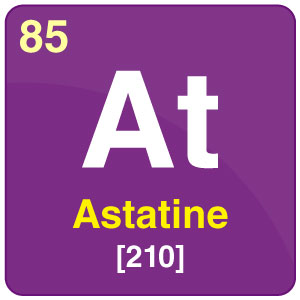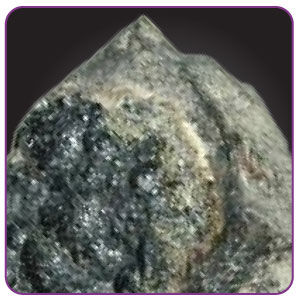Astatine

| Symbol | At |
| Atomic Number | 85 |
| Atomic Mass | [210] |
| Discovered by | Astatine was discovered by Dale R. Corson, Kenneth Ross MacKenzie, Emilio Segrè |

What is Astatine?
- Astatine is the 85th element of the periodic table with a symbol ‘At’.
- It is a radioactive element and is said to be the most heavier among the halogens. This element exhibits similar chemical properties that of the element iodine.
- The isotopes of astatine have a short life of about 8.1 hours, and some isotopes are said to be unstable. It has about seven isotopes. This element appears as a black solid with a metallic look.
- It is considered as one of the rarest occurring natural element. About 2.36 × 1025 grams of the earth’s crust comprises of astatine which measures about lesser than 1 gram. Astatine is mainly formed by the decay of thorium and uranium.
Chemical Properties of Astatine
| Group | 17 | Melting point | 300°C, 572°F, 573 K |
| Period | 6 | Boiling point | 350°C, 662°F, 623 K |
| Block | p | Density (g cm−3) | Unknown |
| Atomic number | 85 | Relative atomic mass | [210] |
| State at 20°C | Solid | Key isotopes | 210At, 211At |
| Electron configuration | [Xe] 4f14 5d10 6s2 6p5 |
Uses of Astatine
- As astatine behaves similarly as iodine, it gets secreted in the thyroid gland. Hence it is used for treating diseases related to the thyroid.
- The isotope called Astatine-211 is utilized in the process of radiotherapy. It is also employed in the treatment of cancer as it is known to destroy cancer-causing cells.

Comments